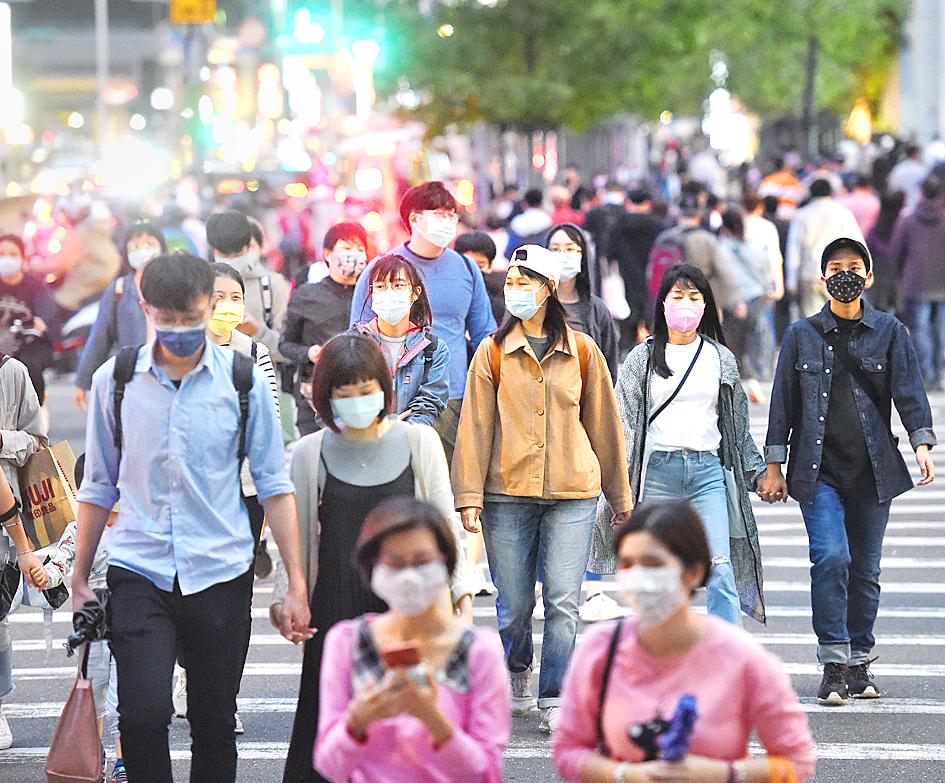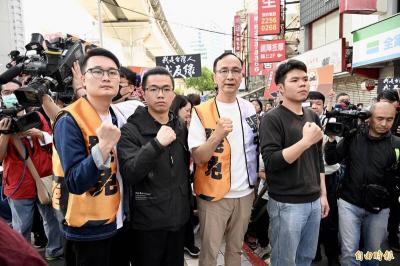Several foreign missions in Taiwan have urged the government to ease its strict COVID-19 border controls, which they say are hurting in-person exchanges and business operations.
The missions made the appeal in response to media inquiries on how the border controls have affected their respective countries’ exchanges with Taiwan, amid growing concerns voiced privately by Taiwan-based foreign offices and businesses regarding the restrictions.
Taiwan has maintained strict entry requirements since March last year, generally prohibiting most arrivals except for citizens and foreign residents, while it has required those who enter the country to undergo a stringent 14-day quarantine.

Photo: Fang Pin-chao, Taipei Times
Although the rules have been marginally adjusted over the past 18 months, they have been especially strict since May 19, when Taiwan experienced an outbreak of locally transmitted COVID-19 infections.
At present, exceptions to the visitor ban can only be made in emergencies or for humanitarian reasons, but in such circumstances, those involved are required to apply in advance to the Central Epidemic Command Center (CECC) for permission to enter the country.
Asked about the controls, the French Office in Taipei said that the French community in Taiwan was grateful for measures “that make us safer here than any other part of the world.”
However, it called on local authorities to consider gradually relaxing the restrictions to allow for the entry of a greater number of international travelers, “especially those who are fully vaccinated.”
The suspension of visas has had a significant effect on French companies operating in Taiwan, causing disruptions for their workforce, the office said in a written response.
“They cannot bring in the foreign experts they need for the implementation of certain critical projects, in particular in the manufacturing industry (semiconductors in particular), but also in transport infrastructure projects (metro) or in the energy sector (offshore wind power),” it said.
The German Institute Taipei said that German companies need experts to enter Taiwan so that businesses can continue operating and implement new projects.
For example, in the offshore wind sector, the border controls “are very counterproductive as projects cannot be completed on time.”
The German section of the European School is still short three new teachers who cannot come to Taiwan because their family members are not allowed to accompany them, it added.
The European Economic and Trade Office said that it understood the need for strict measures to fight the COVID-19 pandemic, “but there is a clear sense within the international community here — diplomats, expats, students, families — that Taiwan is missing out on person-to-person contact.”
“It is much more difficult to bring in staff and their families from abroad. Everybody is looking forward to more flexible measures so that normal exchanges can resume,” it said.
Singapore’s top envoy to Taiwan, Yip Wei Kiat (葉偉傑), shared similar concerns, and urged Taiwan to learn from Singapore’s example by gradually opening its borders.
Since the COVID-19 situation in Singapore and Taiwan stabilized late last year, Singapore unilaterally opened its borders to travelers from Taiwan, he said.
Travelers who met the criteria were only subjected to one polymerase chain reaction test upon arrival in Singapore, and they could pass through the border without a quarantine if they tested negative, he added.
In response, Centers for Disease Control Deputy Director-General Chuang Jen-hsiang (莊人祥), who is the CECC’s spokesman, said that the strict disease prevention measures were imposed to keep COVID-19 out of Taiwan.
Foreign companies in Taiwan that wish to bring in foreign employees need to have an application approved by the CECC, but even those allowed in are subject to a 14-day quarantine, like everybody else, he said.
If a company wants to shorten the quarantine period for an employee brought in from abroad, it must file a comprehensive COVID-19 prevention plan to the government unit in charge of their line of business before that agency relays the plan to the CECC for approval, he said.

The Ministry of Economic Affairs has fined Taobao NT$1.2 million (US$36,900) for advertisements that exceeded its approved business scope and ordered the Chinese e-commerce platform to make corrections in the first half of this year or its license would be revoked. Lawmakers have called for stricter supervision of Chinese e-commerce platforms and more stringent measures to prevent China from laundering its goods through Taiwan as US President Donald Trump’s administration cracks down on origin laundering. The legislature’s Finance Committee yesterday met to discuss policies to prevent China from dumping goods in Taiwan, inviting government agencies to report on the matter. Democratic Progressive Party

Taiwan and its Pacific ally Tuvalu on Tuesday signed two accords aimed at facilitating bilateral cooperation on labor affairs, according to Taiwan’s Ministry of Foreign Affairs (MOFA). The governments inked two agreements in Taipei, witnessed by Foreign Minister Lin Chia-lung (林佳龍) and visiting Deputy Tuvaluan Prime Minister Panapasi Nelesone, MOFA said in a news release. According to MOFA, the agreements will facilitate cooperation on labor issues and allow the two sides to mutually recognize seafarers’ certificates and related training. Taiwan would also continue to collaborate with Tuvalu across various fields to promote economic prosperity as well as the well-being of their

Taiwan would welcome the return of Honduras as a diplomatic ally if its next president decides to make such a move, Minister of Foreign Affairs Lin Chia-lung (林佳龍) said yesterday. “Of course, we would welcome Honduras if they want to restore diplomatic ties with Taiwan after their elections,” Lin said at a meeting of the legislature’s Foreign Affairs and National Defense Committee, when asked to comment on statements made by two of the three Honduran presidential candidates during the presidential campaign in the Central American country. Taiwan is paying close attention to the region as a whole in the wake of a

The Taipei District Prosecutors’ Office has continued its investigation into allegations of forged signatures in recall efforts today by searching the Chinese Nationalist Party’s (KMT) city chapter and questioning several personnel including the chapter director, according to media reports. Among those questioned and detained were KMT Taipei chapter director Huang Lu Chin-ju (黃呂錦茹), chapter secretary-general Chu Wen-ching (初文卿), chapter secretary Yao Fu-wen (姚富文) and first district committee executive director Tseng Fan-chuan (曾繁川). Prosecutors said they would not confirm reports about who had been summoned. The investigation centers on allegations that the ongoing recall campaigns targeting Democratic Progressive Party legislators Rosalia Wu (吳思瑤)